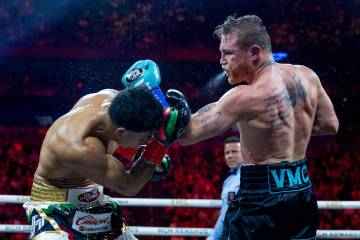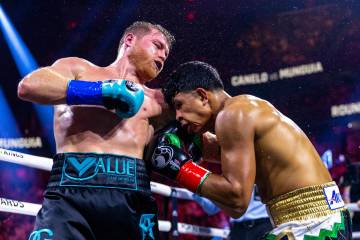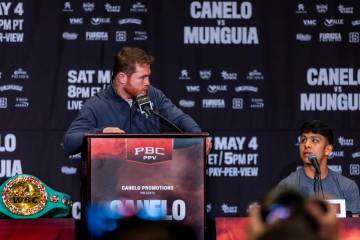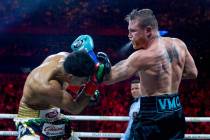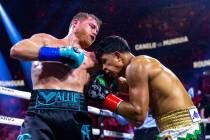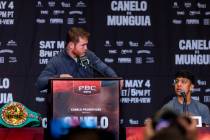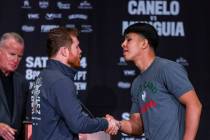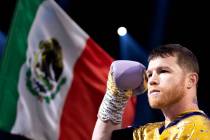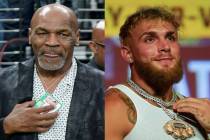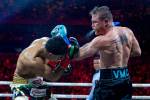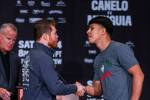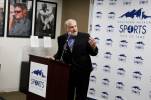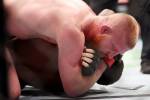Brain study could help fighters decide when to retire
A new study by the Cleveland Clinic Lou Ruvo Center for Brain Health could ultimately let professional fighters know when they should hang up their gloves or suffer permanent brain damage.
The result of that research, which would monitor fighters' brains over four years to get a better understanding of head trauma, also could be used to give licensing commissions objective data to determine when, or if, a fighter should return to the ring after a knockout or a bad beating.
The fact that Las Vegas is known as the boxing capital of the world and home to the Ultimate Fighting Championship stable of mixed martial arts fighters made the Ruvo Center "a natural" for such a study, researchers said.
Anthony Lenk, a Las Vegas junior welterweight who has a 12-1 boxing record, said Monday that he believes the study is a good idea.
"I've noticed that when fighters stay too long, the punches have a big effect on the brain," the 21-year-old boxer said. "And anything with the brain, you don't want to mess with. ... I'm going to check it (the study) out."
Vitor Belfort, the former light heavyweight champion in Ultimate Fighting Championship, called the study "awesome."
"Our sport is really just starting to grow, and ... we need to study all kinds of things. This is definitely one of them," the 34-year-old mixed martial arts fighter said. "I'm lucky to work for a company in the UFC that really supports health for all of the athletes. They don't like seeing guys get knocked out over and over, and they encourage fighters to retire when that is happening. They are always looking out for the health of all of the fighters, and this is just another thing that could help with that."
Those are the type of reactions that researchers are hoping for as they move forward with research that potentially could limit punch drunk syndrome, or dementia pugilistica, and other neurological damage so often associated with former fighters.
KERKORIAN FOUNDATION PROVIDES GRANT
Researchers, who already have begun testing some 20 participants, hope to get more than 650 boxers and mixed martial arts fighters to volunteer for the project. Billionaire Kirk Kerkorian's Lincy Foundation funded the study with a grant of more than $400,000.
Pat Barry, a local boxing trainer, isn't sure the study will be applauded by everyone.
"I think for young fighters, it can be a good thing," he said. "You start with a baseline and follow their progress throughout their career. You can get an accurate measurement of how their brain has been impacted. But I can see where an older fighter might not want to participate. They might be afraid they'll find something and force them to quit boxing."
Dr. Charles Bernick, associate director of the Ruvo Center and the neurologist leading the study, said test results of the study will be completely confidential. He said it will be up to licensing commissions across the country eventually to stipulate testing and regulations if the research shows that testing can provide solid insight into the condition of the brain.
Study participants will undergo four annual MRI brain scans, along with cognitive and speech tests and physical exams to monitor how brain activity can be changed by head trauma in the ring.
"This study will help us to better understand what happens in a fighter's brain in the course of a career," said the Cleveland Clinic's Maureen Peckman, who is coordinating the study between the Lou Ruvo Center for Brain Health, officials with the Nevada State Athletic Commission and boxing and mixed martial arts promoters. "We need evidence-based protocols for people to make objective, rather than subjective, decisions about when someone can participate."
BRAIN SCANS WILL BE EMPLOYED
Changes in brain volume, scarring and blood flow will be measured through brain scans. Changes seen on a participant's MRI will be correlated with their performance on cognitive assessments and neurologic exams. When fighters show a correlation between MRI findings and cognitive decline, researchers hope to determine whether there is a relationship to a number of factors, including knockouts, number of rounds fought and number of blows suffered.
"It's important to know the true brain health impact that boxing and other combative sports have on fighters," said Dr. Michael Modic, chairman of the Neurological Institute at the Cleveland Clinic in Ohio. "We hope to find a way to identify fighters with repetitive injuries to be able to knowledgeably tell fighters when to hang up the gloves and help them heal."
Currently, there is no way to determine whether a fighter has sustained, cumulative brain damage. Unless there is a documented head injury, only one MRI result must be given to the state athletic commission by a boxer over the course of his career.
Peckman said it is possible that regulations could be put in place that would call for a boxer to have a yearly MRI.
Keith Kizer, executive director of the athletic commission, noted that the benefits from the study can go well beyond sports.
"It's not just about making boxing or mixed martial arts safer, but all head injuries, like in car accidents," he said. "Maybe it can lead to a cure for Parkinson's or Alzheimer's."
Kizer said that the commission can't force fighters to participate. But he praised promoters for their cooperation.
EFFORT SUPPORTED BY PROMOTERS
Peckman said boxing promoters Bob Arum and Richard Schaefer and Ultimate Fighting Championship chairman Lorenzo Fertitta are encouraging fighters to participate in the study.
"These people care and love each other in the sports deeply," she said. "They want to protect each other. "
Todd duBoef, president of Top Rank boxing, said the study "is important to us because the more information we have, the more lives we can save."
Gil Martinez, who teaches boxing to mixed martial arts fighters at Xtreme Couture gym in Las Vegas, is also squarely behind the research effort.
"Anything that can help these guys understand the trauma their heads are going through is a step in the right direction," he said. "A lot of MMA fighters don't wear headgear when they're sparring and something like this might show them the dangers they are putting their heads through."
Bernick said the Ruvo Center has only one major goal.
"Our goal is to help the next generation of fighters by improving fighting safety," he said. "New technologies, such as advanced MRI scanning, may offer us the ability to determine who is at greatest risk to develop permanent brain injury and to detect it at its earliest stages."
Contact reporter Paul Harasim at pharasim@review journal.com or 702-387-2908. Contact reporter Steve Carp at scarp@reviewjournal.com or 702-387-2913. Contact reporter Adam Hill at ahill@reviewjournal.com or 702-224-5509.




